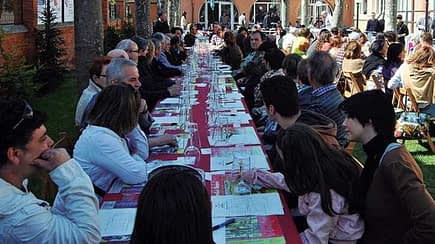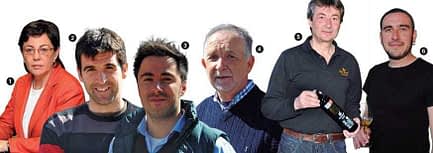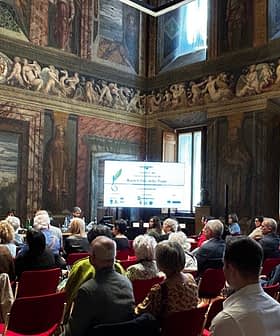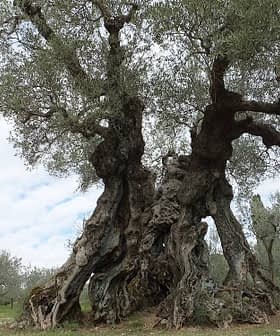When the people of Moreda de Álava say they are going to organise a party, you can be sure they’ll keep their word. Unlike other oil culture celebrations, which tend to contribute little and bore a lot, the I Fiesta del Aceite de Oliva de Álava succeeded in masterfully combining the culture of a practically unknown product, even in the province it is produced in, with numerous fun activities for the whole family.
Normally, the majority of tourists that visit the southernmost extreme of the Basque Country every year don’t even realise the olive exists. And we certainly cannot reproach them for this. Particularly bearing in mind that, when they travel here, they tend to do so attracted by the evocative suggestions of the Rioja Alavesa Wine Route that tempt all and sundry to explore it.
At these latitudes, visitors are almost inevitably, rapidly seduced by the excellent wines of the land, the impossible and majestic architecture of the bodgeas –some modern and some old‑, the immensity of the vineyards, the luxury of the hotels or the distant history contained in the museums. With so many irresistible stimuli all around, in reality it is hard to pay any attention to other charms which, less fortunate, tend to go unnoticed.
Among the latter, the olive trees patiently await their well-earned protagonism, sometimes hidden by the weeds and others blending their presence in among the long rows of vines. The same vines and fields of cereals that have been stealing land from these olive trees over the last decades but now seem willing to return them.
A tradition restored
The olive tree in the Rioja Alavesa region appeared to be condemned to extinction. In fact, only the oldest neighbours recalled the important role it had played in the local economy until the middle of the last century. Yet, when on its deathbed and about to disappear, luck turned her smile on it once again. And it did so through various public and private initiatives, which have been created to restore the dignity of these trees that should never have been lost in the first place.
Many of these projects are already a reality, such as the Proyecto Oleum, which we spoke of at length in the 16th edition of this magazine; or the A.D.O.R.A. Association, which we also mentioned in these pages. For its part, others are gradually being set in motion, for instance, through bodegas traditionally dedicated to vine cultivation and wine production.
In any case, the recent and growing interest in the Rioja Alavesa olive groves has given rise to an increase in the surface area dedicated to this crop to over “300 hectares, which will become 500 in a few years time thanks to new plantations”. This, at least, is the forecast made by Borja Monje, regional Agriculture representative for Álava. Since taking over this position a few months ago, this young man who is a native of the area has set himself the personal challenge of recovering the olive trees in his land. With this aim in mind, “the Álava County Council will do everything within its power”, he promised with conviction.
We met up with the Representative in Moredo de Álava, a small town which has earned itself the title of oil capital of the Rioja Alavesa. This distinction, in turn, gave rise to the celebration of the Fiesta del Aceite de Oliva de Álava, on March 24.
More than one reason for celebration
With an olive oil industry in the midst of a recovery process, some extra virgins that conquer palates wherever they go and growth forecasts as ambitious as they are realistic for this sector in the region, it was just a question of time before the olive producers got together to savour the fruits of their success together. And why not share their satisfaction with the rest of their friends and neighbours too?
Attracted by the smell of roasting chickens on the main street more so than the aroma of new oil, hundreds, maybe even thousands, visited Moreda to quickly mingle with the just over 200 local inhabitants who see each other daily.
In reality, many of these visitors, the majority from the Basque Country, came without really knowing what to expect. Just a few knew that olive oil was produced in their own land and many were aware that just one day earlier, this product had been certified with the Eusko Label. This seal, granted by the Basque Government, guarantees “its quality, its origin and its sustainable production”, as Jakes Agirrezabal, managing director of the Corporación HAZI, explained to us. An explanation also shared by Pilar Unzalu, regional Agriculture Minister for the Basque Country, as she believes that said quality represents both “a challenge and an opportunity”.
And so the majority of visitors discovered that Moreda holds the largest olive grove surface in the entire Rioja Alavesa (from which it gets its title of oil capital of the region). Many of them visited the centenary oil press which, located in the village centre, shares installations with the modern mill that currently extracts the extra virgins of La Equidad cooperative.
In total, almost 3000 people got to see the old mill working and, thanks to the explanations of José Ramón Ceballos and Jesús Eraso, members of the Governing Board, they could “compare it with the current machinery to gain a complete understanding of the olive oil extraction process”.
As if this were not enough, the most curious visitors took a bus tour to also enjoy an interesting route through the centenary olive groves of the area, many of which have been completely recovered.
A tasting session of many
Back in Moreda, both children and adults learned to taste the olive oil, to identify its organoleptic sensations and to discover its quality. This mass tasting session took place in one of the village squares, in which hundreds of people came together to savour the first oils of the season, following the simple instructions provided by the organisers of the act. In this case, the honour was shared by the chefs, Luis Ángel Plágaro (Cocina de Plágaro), Juan Gil (Mesón Erauskin) and Roberto Ruiz (Frontón de Tolosa), who revealed the benefits of the Arróniz varietal to their countrymen.
And the fact is, this olive type is currently produced by various brands. Among these, Lurzabal, produced in the heart of the Proyecto Oleum for the Álava Council, stands out; as do La Equidad, Rivo de Moreta, Hermanos Bujanda or those made by the Asociación A.D.O.R.A.
All of these share “a series of specific characteristics”. According to Juan Luis Bujanda, one of the many organisers of the festival, and co-owner of the Hermanos Bujanda brand, “our varietal is grown in a borderline zone, climatologically speaking, between the Mediterranean climate and the Atlantic”. For this and other reasons, the Arróniz olives “present a large polyphenol concentration that makes its oil highly aromatic and quite bitter and spicy”.
Olive oil and other products of the land
Organised with a view to repeating the event in the years to come, the I Fiesta del Aceite de Oliva de Álava succeeded, beyond a shadow of a doubt, in meeting the expectations of all of its participants. Apart from the aforementioned cultural visits, visitors could also buy some of the most typical Álava products from various stalls set up around the council square. These included Añana salts, Montaña Alavesa cheeses, Zuia beer, Moreda wine, Treviño pulses, the Aiales txacoli wine and, naturally, the extra virgin olive oil of the Arróniz varietal.
The curiosity of the visitors, constantly surprised by the extensive local delicatessen, managed to exhaust the supplies of the majority of stalls. They had sold everything! A very comforting image, particularly in current times when consumption just cannot seem to take off.
On the way to the Laboratorio del Gusto, organised by Slow Food Araba, the crowd travelling there inevitably bumped into the Proyecto Oleum stand, which its coordinator, Fernando Martínez-Bujanda, had not left for a second the whole morning. This was where many of us left with the desire to buy one of the boxes of Arróniz olive oil chocolates prepared especially for the occasion. Once again, the product literally flew off the shelves. Proud of this success, Fernando took advantage of the occasion to “publicly thank all the volunteers for their effort in making the festival possible, as well as the great job done by Artepan, which managed to make some delicious chocolates”.
Luckily, the fortuitous encounter between the cocoa and the olive oil was also present at the tables of the aforementioned Laboratorio del Gusto, which also organised tastings of cheese, cider, tapas and other typical products.
Chatting with Alberto López de Ipiña, president of Slow Food Araba, we discovered that this association had collaborated in a completely selfless way in the organisation of the various acts that made up the event. In fact, the money made from the sale of the chocolates and tickets to the Laboratorio del Gusto will be donated to the Asociación Berakah”, he told us.
And at this stage, as if we hadn’t eaten enough already, the festival concluded with a big popular meal, also organized by Slow Food Araba, that sated the appetite of even the hungriest visitors.
An option to bear in mind
Some more pompous, others more formal, others even boring… the Spanish oil geography is spattered with various festivals paying homage to the cult of olive oil. However, not all can claim to be for all ages.
On its very first edition, the Fiesta del Aceite de Oliva de Álava has already consolidated itself as a popular celebration that is highly recommendable for the whole family. In this sense, its unquestionable success would not have been possible without the collaboration of the young people from the village, such as Iker Díaz de Cerio and Aitor Marauri, from the mill, Rivo de Moreta; Juan Luis Bujanda, from the company, Hermanos Bujanda; or the members of the Trujal Cooperativa La Equidad, who all offered their help free of charge to make sure that everything ran perfectly.
This event, apart from boasting excellent organisation, literally responds to the festival concept, which goes beyond the pure oil exhibition.
If the weather permits, as it did last March 24, children can calmly enjoy the Oil Workshop while learning curiosities about olive oil. The adults, for their part, can revise their knowledge and share experiences in a fun and relaxed atmosphere. Later on, they can taste the region’s gastronomic gems together.
- Pilar Unzalu. Pilar Unzalu, regional Minister for Agriculture of the Basque Government, has always shown her support for the Álava olive oil, a quality product she considers both a challenge and an opportunity.
- Jakes Agirrezabal. The managing director of the Corporación HAZI, Jakes Agirrezabal, came to the fair as the manager of the Eusko Label, the quality seal that guarantees the quality of the Álava olive oils.
- Borja Monje. Agriculture Representative for Álava, Borja Monje, enjoyed the festival among his countrymen, to whom he has a personal commitment to recover the olive groves of their land.
- Fernando Martínez-Bujanda. Tireless, Fernando Martínez-Bujanda attended the Proyecto Oleum stand, while also making sure that everything ran smoothly at the festival.
- Juan Luis Bujanda. Juan Luis Bujanda, one of the many organisers of the festival, and co-owner of the Hermanos Bujanda brand, explained the peculiarities of the Arróniz olive to visitors.
- Alberto López de Ipiña. Both Alberto López de Ipiña, president of Slow Food Araba, and all of his team took part in the organisation of the Laboratorio del Gusto, the tasting session and the popular meal, without any vested interest.
.
Trujal. Numerous members of the Cooperativa La Equidad expressed their pride in their museum, their modern mill and their oils to all those who came to meet them.
Olivarama articles also appear in Olivarama magazine and are not edited by Olive Oil Times.










